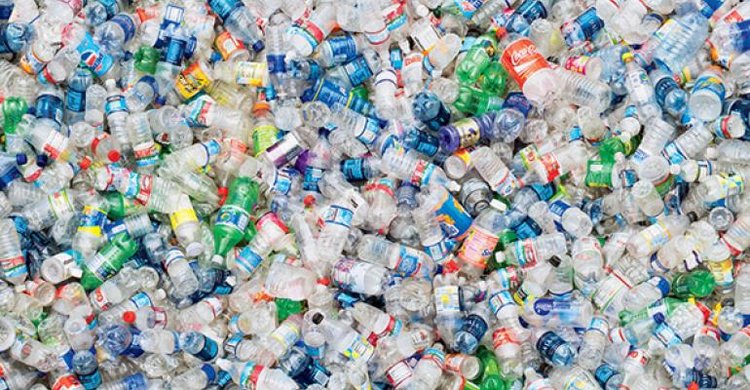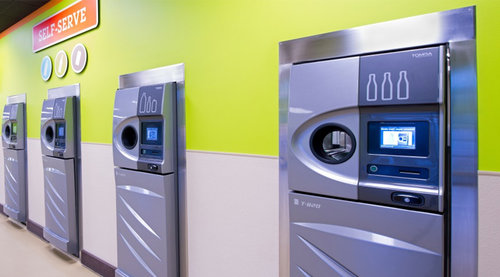Norway, Oregon’s Bottle Bill and Plastic Recycling

China’s refusal to keep buying US-sourced recyclable materials and the mounting threat of plastic pollution in the ocean have redirected attention to schemes such as beverage container redemption, in which Oregon has been a leader.
The HuffPost headline was breathless: “Norway has radical approach to plastic pollution and it’s working.” The radical approach: Bottle deposits.
For Oregonians, bottle deposits and redemption hardly sound radical or new. Oregon passed its Bottle Bill in 1971 and implemented it the following year. The containers covered under the Bottle Bill were expanded in 2011. And now Oregon has something called BottleDrop, strategically located regional redemption centers with reverse vending machines that swallow cans, glass container and plastic bottles.
On a typical weekend afternoon, people stand in line waiting to feed a redemption unit that spits out a receipt at a rate of 10 cents per container. Some people drive up in trucks heaped with bottles and cans.
Oregon’s original deposit was a nickel. It was increased to a dime when recycling rates fell below a legislatively set target. The higher redemption rate was predicted to double Oregon’s container recycling rate.
Norway’s system is set up somewhat differently and boasts an impressive 97 percent plastic bottle recycling rate. Norway achieved that recycling rate by hiking the redemption fee on plastic bottles to 15 to 30 cents, depending on container size. There are reverse vending machines all over the place, including schools. Norwegian supermarkets accept used bottles in return for store credit.
The biggest difference is Norway imposes a tax on plastic bottles that aren’t recycled. Higher redemption fees can be built into prices for textiles and packaging (including “new” plastic bottles) made from recycled plastic bottles. Plastic bottles in Norway are limited to types of plastic that can be recycled in Norway.

Oregon is moving toward regional beverage container redemption centers that feature units capable of accepting aluminum cans and glass and plastic bottles.
What’s interesting, at least to long-time Oregonians, is the failure to the HuffPost story to mention Oregon. It cites Vermont’s copy-cat bottle bill enacted in 1972 and California’s more recent recycling efforts with beverage containers.
Despite the oversight, it is a fair question to ask why bottle bills haven’t been enacted more broadly in the United States. Instead, a number of states passed bottle bill bans, often with the financial backing of beverage producers.
As concern grows about discard plastics flooding into the ocean and affecting ocean ecosystems, plastic recycling has attracted attention. According to HuffPost, the PepsiCo Foundation has donated $10 million to make municipal plastic recycling easier. The Strawless in Seattle movement has taken aim at single-use plastic products and persuaded brands such as Starbucks to forego plastic straws.
However, none of these efforts replicates Norway’s closed-loop system for plastic bottles. Scaling up such as a closed-loop system would require changes in the way plastic products are manufactured. After all, redeeming plastic bottles is only useful if the plastic can be recycled. China’s refusal to continue to buy mixed loads of potentially recyclable material has raised questions about the viability of plastic bottle recycling.
There may be some hopeful developments. “London-based Polymateria is developing next-generation plastics that biodegrade or can be recycled, depending on where they end up,” HuffPost reported. “Polymateria CEO Niall Dunne says many plastic brands use multiple resins and additives that the system cannot deal with and prioritize marketing over solutions for when plastic products reach the end of their lives.”
An overlooked aspect of Oregon’s original Bottle Bill was redemption of refillable glass bottles. Breweries such as Portland-based Blitz-Weinhard featured reusable glass bottles. Customers brought them back to grocery stores that redeemed them and returned them to the brewery. Average glass bottles could withstand three or four reuses.
The refillable bottle gave way under pressure from grocers who disliked the hassle, hand counts and mess in their backrooms. Retailers like Winco reached the point of refusing to stock beer in reusable bottles.
Now there is a movement to bring back the refillable bottle. Brewers such as Double Mountain brewery are working with the Oregon Beverage Recycling Cooperative and Owens-Illinois on standardized glass bottles that are thicker and have a special finish to hold up to repeated washings.


Advertisement